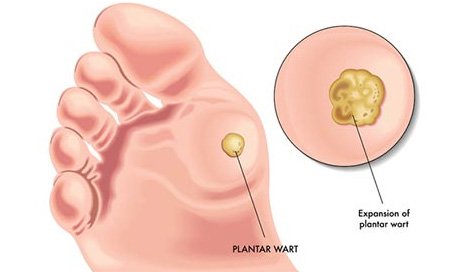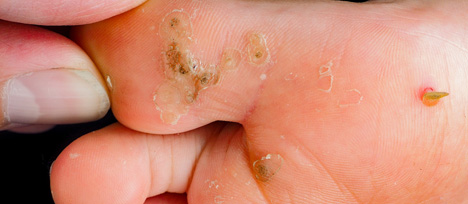Plantar Warts

Warts are caused by a virus that lives in the skin. Plantar warts are easily transmitted through touch and from surfaces at the pool or in public showers. Plantar warts are warts found on the bottom of the foot. These warts are often painful and can be tough to treat given the thickened skin in this area. Many treatments are available for plantar warts from various topical medications to surgical excision of the skin lesions. All symptoms should always be evaluated with a thorough consultation and examination by your podiatrist for an accurate diagnosis and treatment plan to exclude any underlying serious condition.
Plantar Warts Explained
Plantar refers to the bottom of the foot and this is where plantar warts are typically found. Your podiatry doctor in New York can assist you in treatment of this problem. Pretty much every person gets a wart at some point during their life. They are so ubiquitous in the United States that you can find multiple wart treatments in any drug store. Warts are especially common in children. Your foot doctor in New York offers many treatments for warts and will be able to offer new options if prior ones have been unsuccessful. Manhattan podiatrist is among the best in the business at curing your lower extremity ailments — warts and all.

Plantar warts are non-cancerous, but sometimes cancerous lesions can be mistaken for warts. They are skin growths caused by viral infections in the top layer of skin. The virus is a human papilloma virus, more commonly referred to as HPV. There are actually many different strains of this virus, and they can affect various areas of your body. Manhattan podiatrists report that the HPV strain that causes plantar warts isn’t the same as the HPV that causes genital warts.
Plantar warts are easily transmitted through touch and from surfaces at the pool or in public showers.While plantar warts aren’t pretty, they aren’t malignant or even particularly harmful. They are, however, a contagious viral infection. They can spread or be passed to other people. Most warts go away on their own in a year or two even without treatment. While plantar warts can become irritated or painful, their biggest impact is that they can cause you to be self-conscious about your feet.
Symptoms of Plantar Warts
Plantar warts are generally small, but can become quite large. Most are the size of an eraser on the end of a pencil. Warts on your feet tend to be flatter than warts on other areas of your body due to the fact that they are compressed by our body weight. They can appear alone or grow in groups or clusters. When this happens, they’re called mosaic warts, which is a kind name for a less than attractive condition that your midtown Manhattan podiatrist can help you treat.
Small blood vessels grow into the warts, appearing as little black dots in the center. These warts have mistakenly been called seed warts. But as any best foot doctor in New York can tell you, warts don’t have seeds. Small blood vessels grow into the warts, appearing as little black dots in the center. Corns and calluses can also be mistaken for plantar warts. That’s why it’s best to have any questionable growths checked out thoroughly by your podiatrist.
”
★ ★ ★ ★ ★The doctor is courteous, professional and to the point. He does not keep patients waiting and spends ample time with them. I have seen him several times for foot issues and I have been satisfied each time with his skill in assessing and care for each patient.
Common Causes
Since warts are contagious, the spread from one foot to the other. They can also spread from person to person. This transmission can be indirect — by sharing shoes or standing in the same shower as an infected person. Your risk of getting warts varies. If you have a weakened immune system or are predisposed to the virus, then your chances are higher. But you can take precautions to avoid infection. Wear sandals in locker rooms. Don’t share your shoes. Keep your feet clean and dry. Your podiatrist in Manhattan can give you a full list of precautions.Plantar warts are easily transmitted through touch and from surfaces at the pool or in public showers.
Diagnosis and Treatment
In most cases, your foot doctor in NYC can diagnose plantar warts by:
- Simply examining the growth or lesion on your foot
- Slicing the lesions and checking for the tiny blood vessels that are sometimes mistaken as seeds
- Removing a small piece of the growth (biopsy) and sending it to the laboratory for analysis
Treatment for plantar warts comes in as many forms as there are old wives’ tales. Your foot doctor in New York may recommend prescription wart treatments in conjunction with in office procedures. As with most medical issues, you’ll receive the most effective treatments from a knowledgeable New York City’s foot doctor. Your podiatrist in midtown Manhattan can help you determine which treatments are best suited to your individual case. These treatments include:
- Freezing the wart off cryogenically with liquid nitrogen. This is done exclusively at your podiatrist’s office, since it involves numbing your foot to lessen the pain of the cold.
- Covering the warts or injecting medicine to strengthen your immune system can rid your body of the virus.
- Stronger peeling medicines that feature salicylic acid work by removing layers of warts a bit at a time. Your podiatrist recommends applying the medicine on a regular basis at home and then coming in for a regular appointment at the office to monitor your progress.
- Other acids your NYC foot doctor may use involve bichloracetic or trichloroacetic acids. These treatments require weekly visits to the office.
- In some cases, minor surgery may be needed. It involves cutting the wart away or destroying it with an electric needle. This procedure requires local anesthesia because it can be painful or cause scarring. This is the least-used method in the treatment of plantar warts because of the risks inherently involved with surgery.
- Vaccines against the HPV virus have been used to successfully treat and prevent warts.
- Silver nitrate is also available as a solution or ointment to be applied topically.
Prognosis
Foot warts are especially difficult to treat by your NYC podiatry doctor because they lay mostly below the surface, like an iceberg. Even when treatments are successful, it’s possible for a wart to return. Due to the contagious nature, podiatrist always recommend treatment even if your wart in non-painful. It is possible for warts to spontaneously resolve without treatment, but often the duration of the lesion can be decreased with intervention by a physician.
But with the assistance of a good New York foot doctor you can completely bypass the embarrassment of plantar warts. It’s always best to seek the advice of trained medical professionals. And Manhattan podiatrists are always willing to help you address any issues with your feet.
Do you have any questions about Plantar Warts treatment in NYC? Would like to schedule an appointment with an internationally recognized, top NYC Podiatrist and foot doctor at New York Podiatry Specialists, please contact our office for consultation.
In The Press

Call now to make an appointment with our award winning, board certified NYC podiatrists regarding your health. We look forward to seeing you!
book online now (212) 389-9918(212) 389-1886 Podiatrist (Midtown) 51 East 25th Street, Ste 451, NY 10010
(212) 389-1887 Podiatrist (Union Square) 55 W 17th St Ste 106, NY 10011
(212) 378-9991
